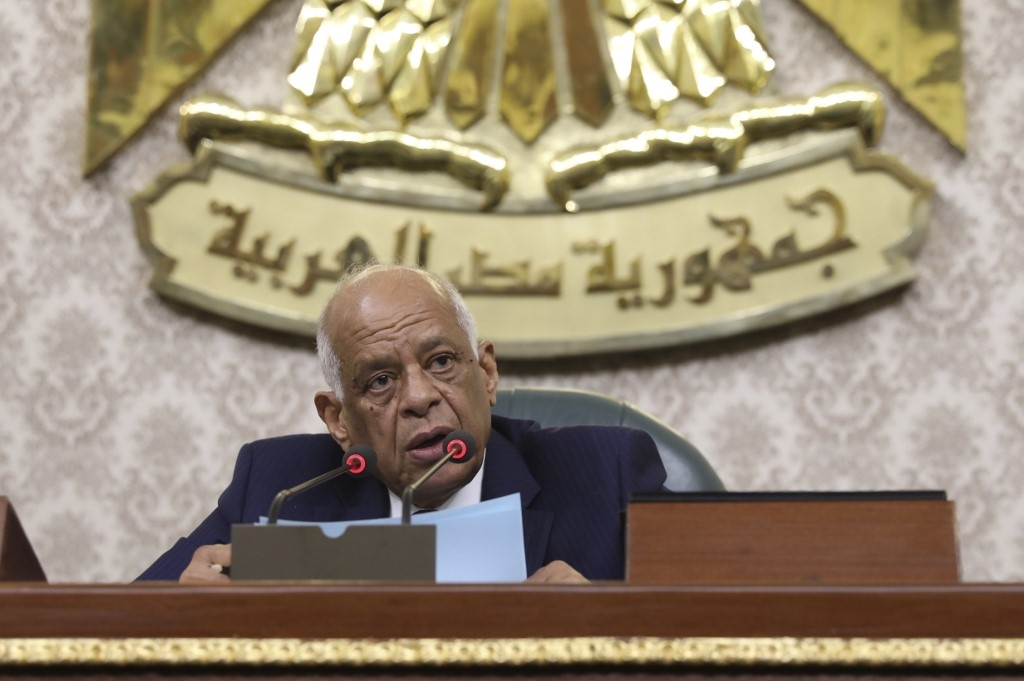Egypt's parliament speaker favourably compares Sisi to Hitler

Egypt's parliament speaker favourably compared President Abdel Fattah el-Sisi to Adolf Hilter on Tuesday, saying the Nazi leader “made mistakes” but “built a strong infrastructure” for his country.
In the opening session of the year's fifth and final parliamentary session, Ali Abdel Aal delivered a speech to MPs calling on them to support Sisi rather than “export problems” to him.
Abdel Aal called on parliamentarians to stand for one minute of silence in a show of support for Sisi’s “project to build the modern Egyptian state”.
'Hitler had his mistakes, but what allowed him to expand eastward and westward was that he created a strong infrastructure'
- Ali Abdel Aal, parliament speaker
“Nation building in transitional periods requires harsher measures… No country would progress without a strong infrastructure,” he said.
“Hitler had his mistakes, but what allowed him to expand eastward and westward was that he created a strong infrastructure for the German state that remains the source of its leading position in the first world.”
In his opening remarks, Abdel Aal criticised the government for the lack of economic progress, suggesting it works far less hard for the country than Sisi.
"The problem is that we have a president who leaps to achieve goals, and a government that walks with one foot," he said.
The parliament session, which has not yet been broadcast, has been covered by pro-state local media that quoted Ali’s speech.
Abdel Aal’s comments came in the aftermath of a recent spate of anti-Sisi protests and a crackdown that has seen at least 2,000 people arrested, including well-known critics of the president.
Why are Egyptians protesting against Sisi?
+ Show - HideOn Friday 20 September, crowds demonstrated in Cairo and other cities in the first major street protests against president Abdel Fattah el-Sisi since he crushed peaceful protests after coming to power in a military coup in 2013.
The protests came after calls from Mohamed Ali, an Egyptian businessman-turned-whistleblower, for Egyptians to take to the streets following a football match that evening between Al Ahly and Zamalek, the country's biggest clubs.
The owner of a real-estate company that has worked with the Egyptian armed forces for 15 years, Ali has been leading an online anti-Sisi campaign since the beginning of September through a series of video testimonies accusing the president of corruption and misappropriation of public funds.
Some of the projects assigned to his company, he has said, are palatial residences worth millions of dollars built for Sisi and his family since he became defence minister in 2012.
In his only public response to the claims, Sisi did not deny building new palaces, and vowed to build "more and more" palaces "in the name of Egypt".
Sisi's remarks have ignited more opposition, with social media campaigns and hashtags calling on Sisi to step down going viral in Egypt and worldwide.
At a time when opposition is criminalised and tens of thousands of political prisoners languish in Egyptian jails, Ali's revelations have sparked a rare public debate on the military’s opaque budget and the contrast between Sisi’s calls for Egyptians to tighten their belts amid stringent austerity measures and the billions spent on luxury palaces.
Ali, now based in Spain, claims that he is acting individually at his own risk.
But many observers have raised questions over whether he has supporters within Sisi's government who are standing behind his calls for protests or even plotting a coup.
Opponents of Sisi from across the political spectrum have expressed sympathy for Ali’s online campaign, while TV channels run by exiled opposition leaders have reposted his daily videos, watched by millions.
The protests, first held on 20 September, were triggered by video testimonies posted online by an exiled Egyptian whistleblower who accused Sisi and other top officials of corruption and misappropriation of public funds.
The whistleblower, businessman and actor Mohamed Ali, has been the most talked about figure in Egypt since the beginning of September when he started posting daily videos online revealing details of palatial residences built for Sisi using state funds earmarked for the military.
The videos prompted Sisi to respond, saying he did build palaces and “will build more and more” because they are built “for Egypt”.
Middle East Eye propose une couverture et une analyse indépendantes et incomparables du Moyen-Orient, de l’Afrique du Nord et d’autres régions du monde. Pour en savoir plus sur la reprise de ce contenu et les frais qui s’appliquent, veuillez remplir ce formulaire [en anglais]. Pour en savoir plus sur MEE, cliquez ici [en anglais].




